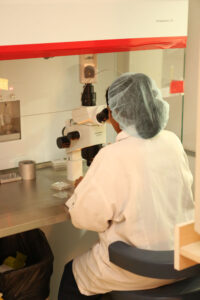Pre Implantation Genetic Screening and Diagnosis (PGD)
PGD (اختيار جنس المولود) is a form of early prenatal diagnosis that is used to detect chromosomal abnormalities in the resulting embryo. It identifies embryos at risk and allows for the prevention of transmission of inherited diseases to the next generation and/or a possible miscarriage during the pregnancy. The embryos used in PGD are created through either IVF or ICSI treatment.
With increasing maternal age, there is a greater chance of more or all embryos being abnormal. At age 40 years, 13% of women have all abnormal embryos. As such PGD is indicated for:
 Who should be treated with PGD?
Who should be treated with PGD?
With increasing maternal age, there is a greater chance of more or all embryos being abnormal. At age 40 years, 13% of women have all abnormal embryos. As such PGD is indicated for:
- Women over the age of 35 years
- Couples with recurrent and unexplained miscarriages
- Couples who have experienced several failed IVF cycles
- Couples who have had a prior pregnancy with a chromosome abnormality
How is the PGD performed?
Pre Implantation genetic diagnosis (PGD) starts with the standard process of egg retrieval following Ovulation Induction and then fertilization of the eggs in a laboratory through IVF or ICSI. The resulting embryos undergo cell division that is monitored. By means of a state-of-the-art laser, a hole is drilled into a 3-day-old embryo and a single cell is harvested for biopsy purposes. Once biopsied and approved, the embryo may be transferred into the woman’s uterus.What are the benefits of PGD?
- PGD can test for a vast variety of genetic conditions.
- Reduced, almost zero risk of passing on a genetic disease to the offspring
- Increased chance of a successful pregnancy with a chromosomally normal embryo.
- Detection of gender based genetic and hereditary diseases
Dr. Pankaj Shrivastav explains what Pre-implantation Diagnosis or PGD is and its role in identifying hereditary and genetic diseases as well as how it finds use in Gender Selection & Family Balancing.
Got a Query? Ask your questions related to PGD treatment. Ask the Doc
